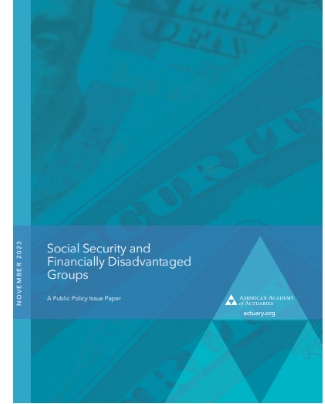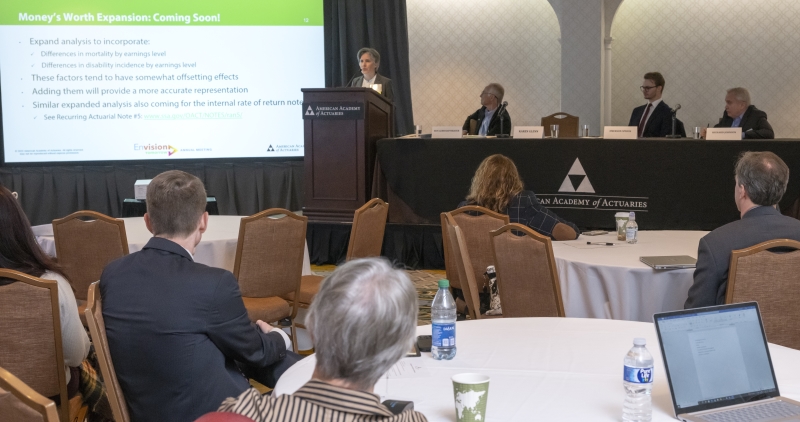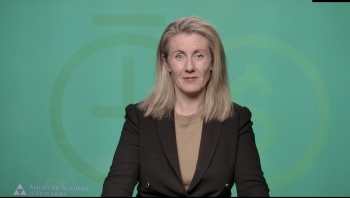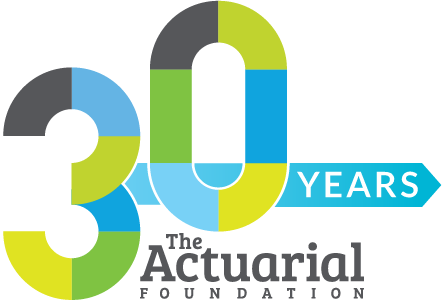Retirement Report, Winter 2024

Vol 7 | No. 1
Introducing the Retirement Practice Council
By Jason Russell
Retirement Vice President
American Academy of Actuaries

RussellThe Academy’s Board of Directors voted to approve the request from the Pension Practice Council to change its name to the Retirement Practice Council (RPC), which became effective Jan. 31.
The name change has been under consideration for many years. While the practice council has long emphasized the policy considerations and opportunities within the defined benefit pension landscape, we also focus on defined contribution plans, Social Security, retirement policy, and plan designs. Because most of the public policy world refers to this area of interest broadly as “retirement,” the name change will improve our ability to engage with policymakers and elected officials on the breadth of issues the RPC considers.
It is important to keep in mind that while the name of the practice council has changed, its scope and purpose have not. The RPC will continue to prioritize matters related to pension plans, while also continuing its focus on all issues in the retirement income and financial security space. We will continue to collaborate with the casualty, health, life, and risk management and financial reporting councils when our work and public policy interests intersect.
The Academy is in the process of making updates to our various webpages to reflect name change. The change will not be made retroactively, so prior publications will continue to reflect the former name.
The Academy website has been updated to reflect the name change. If you see any pages on our website where you think a change is needed and has not been made, please contact Academy Retirement Policy Analyst Philip Maguire.
Retirement Outlook Featured in Contingencies
 Make sure to read “Your Membership in Action,” from the January/February Contingencies, which profiles Academy vice presidents’ outlook for the new year. In “Shaping the future of U.S. retirement with sound analysis of timely issues,” RPC Vice President Jason Russell highlights the Retirement Practice Council’s (formerly the Pension Practice Council) 2024 plans to propel discussions on critical pension and retirement issues within the actuarial community, with policymakers, and among stakeholders.
Make sure to read “Your Membership in Action,” from the January/February Contingencies, which profiles Academy vice presidents’ outlook for the new year. In “Shaping the future of U.S. retirement with sound analysis of timely issues,” RPC Vice President Jason Russell highlights the Retirement Practice Council’s (formerly the Pension Practice Council) 2024 plans to propel discussions on critical pension and retirement issues within the actuarial community, with policymakers, and among stakeholders.
Areas of focus for the year include managing pension risk in a higher interest rate environment, exploring the potential unfreezing of defined benefit pension plans, conducting a comprehensive retrospective and prospective analysis of the Employee Retirement Income Security Act of 1974 (ERISA) on its 50th anniversary, and actively contributing to the ongoing debate on addressing Social Security solvency. Read Russell’s full report in the issue.
Pension Committee Releases Church Plans Issue Brief
The Pension Committee released an issue brief,  Church-Sponsored Retirement Plans—Overview and Considerations, which discusses the broad range of church plans and practices.
Church-Sponsored Retirement Plans—Overview and Considerations, which discusses the broad range of church plans and practices.
Among other considerations, it discusses the impact on a participant of being in a church plan when the ERISA protections and provisions for U.S. tax-qualified single or multiemployer pension plans generally do not apply.
“Because of their exemption from ERISA, church-sponsored plans and plans of church-affiliated hospitals generally have more flexibility than other private pension plans regarding important practices, such as how benefit funding, stability, and security can be managed,” said Academy Senior Retirement Fellow Linda K. Stone. Read the Academy press release.
Learn more: A webinar, hosted in conjunction with the U.S. Government Accountability Office (GAO), will further discuss this topic. Look for more details coming soon.
Social Security Challenge Updated With Latest Data
The Academy’s Social Security Challenge has been updated with information based on the 2023 Social Security Trustees Report, which showed fund reserves are projected to become depleted in 2034—potentially leading to a 20% cut in benefits unless legislative changes are adopted to prevent it. That’s a year earlier than the 2022 Trustees Report projected. The Challenge, released last March, immerses users in a simulated trek through “Townsville,” where users can learn about the program’s challenges and try their hand at various reform proposals. Take the Challenge.
Year-in-Review Public Policy Alert Covers Pension Issues
A year-in-review Academy alert offers highlights of 2023 state and federal legislative and regulatory actions affecting the U.S. actuarial profession and the Academy’s effort to fulfill its role to educate and support our stakeholders on these critical issues.
It includes President Biden’s veto of H.J. Res. 30, which would have barred federal retirement plan managers from considering environmental, social, and governance (ESG) issues in pension investment decisions; Colorado and Maine entering into an agreement to form the nation’s first retirement savings interstate partnership; and several states—including Minnesota, Nevada, and Vermont—approving automatic retirement savings plans.
Your Input Wanted—Cross-Practice ASOP No. 12 Open for Comment
 The Actuarial Standards Board approved an exposure draft of a proposed revision of Actuarial Standard of Practice (ASOP) No. 12, Risk Classification (for All Practice Areas), which applies to actuaries with respect to designing, developing, selecting, modifying, reviewing, evaluating, or opining on any elements of a risk classification framework in connection with financial or personal security systems.
The Actuarial Standards Board approved an exposure draft of a proposed revision of Actuarial Standard of Practice (ASOP) No. 12, Risk Classification (for All Practice Areas), which applies to actuaries with respect to designing, developing, selecting, modifying, reviewing, evaluating, or opining on any elements of a risk classification framework in connection with financial or personal security systems.
Originally adopted in 1989 and last updated in 2005, ASOP No. 12 was developed as the need for more formal guidance on risk classification increased as the selection process became more complex and more subject to public scrutiny. Comments are due by May 1—to weigh in, see the exposure draft.
Issue Paper Examines Social Security & Financially Disadvantaged Groups
 A public policy issue paper, Social Security and Financially Disadvantaged Groups, looks at Social Security benefits that are based on earnings but not affected by such factors as race, ethnicity, gender, or other protected classes of Title VII of the Civil Rights Act.
A public policy issue paper, Social Security and Financially Disadvantaged Groups, looks at Social Security benefits that are based on earnings but not affected by such factors as race, ethnicity, gender, or other protected classes of Title VII of the Civil Rights Act.
Due to people’s divergent earnings histories, Social Security provides less retirement security for some groups than others, on average. The Social Security Committee discussed this issue regarding gender in its 2017 Women and Social Security issue brief, and the paper extends that discussion to other groups. The issue was also the subject of Envision Tomorrow breakout and poster sessions in November.
Actuary Voices Features Past Senior Pension Fellow Ron Gebhardtsbauer
A recent Actuary Voices episode features a conversation with Ron Gebhardtsbauer, a past Academy senior pension fellow and a co-author of the Social Security and Financially Disadvantaged Groups issue paper. Gebhardtsbauer discusses the paper, his experience as a volunteer, and his contributions to the national conversation on Social Security.
Public Plans Committee Releases Practice Note
The Public Plans Committee released Introduction to Service Purchases for Public Pension Plans, a practice note considering a variety of service purchase programs that can be found across public-sector pension plans, as well as plan administration topics that actuaries should be aware of when working with them.
It was developed to provide an overview of methodologies, considerations, and current practices related to service purchases for public pension plans in the United States, and is intended for use by actuaries providing services to plans of this type.
The practice note states that service purchase provisions can vary widely from plan to plan, and as a result no single approach to pricing service purchases is likely to fit all situations, and professional judgment is required.
Envision Tomorrow Breakout Sessions Look at Social Security, Multiemployer Plans
November’s Envision Tomorrow pension and retirement sessions provided valuable perspectives on key issues including Social Security and financially disadvantaged groups, multiemployer plans, and a pension/life breakout session that examined group annuity contracts for pension risk transfer.
Speakers, panelists, and attendees discussed these and many other topics, interacting with in-person and with virtual attendees. And Frank Todisco, chief actuary of the GAO and a former Academy senior pension fellow, received the Robert J. Myers Public Service Award. Grace Lattyak received an Outstanding Volunteerism Award in recognition of her leadership as vice chairperson of the Pension Committee.
For more coverage of Envision Tomorrow, including a complete rundown of P/C breakout sessions, see Envision Tomorrow—A Closer Look, a supplement to Actuarial Update.
Save the Date for This Year’s Annual Meeting—It’s not too early to save the date for the Academy’s 2024 Annual Meeting, which will be held Oct. 15–16, at the Grand Hyatt Washington in the nation’s capital in advance of the presidential election.
Pension Webinar Looks at Capital Market Conditions
A December webinar, “Capital Market Outlook,” which presented an updated look at economic and capital market conditions, reviewed potential economic outcomes, and provided a summary of return outlooks from an array of published capital market models in a post-COVID economy.
Presenters were Evan Inglis and Pension Committee and Social Security Committee member Jerry Mingione. Maria Moliterno, also a member of the Pension Committee, moderated. An on-demand recording is available to Academy members.
Webinar Examines Pension Risk Transfer
A Jan. 25 pension/life webinar, “Group Annuity Contracts for Pension Risk Transfer,” followed up on the popular Envision Tomorrow breakout session in bringing together subject matter experts for a discussion covering the regulatory and structural evolution of insurance companies that provide pension risk transfer group annuity contracts.
Moderators were Brent Dooley, a member of the Academy Research Committee and the Annuity Reserves and Capital Working Group, and Pension Committee Vice Chairperson Grace Lattyak. An on-demand recording is available as an Academy member benefit.




